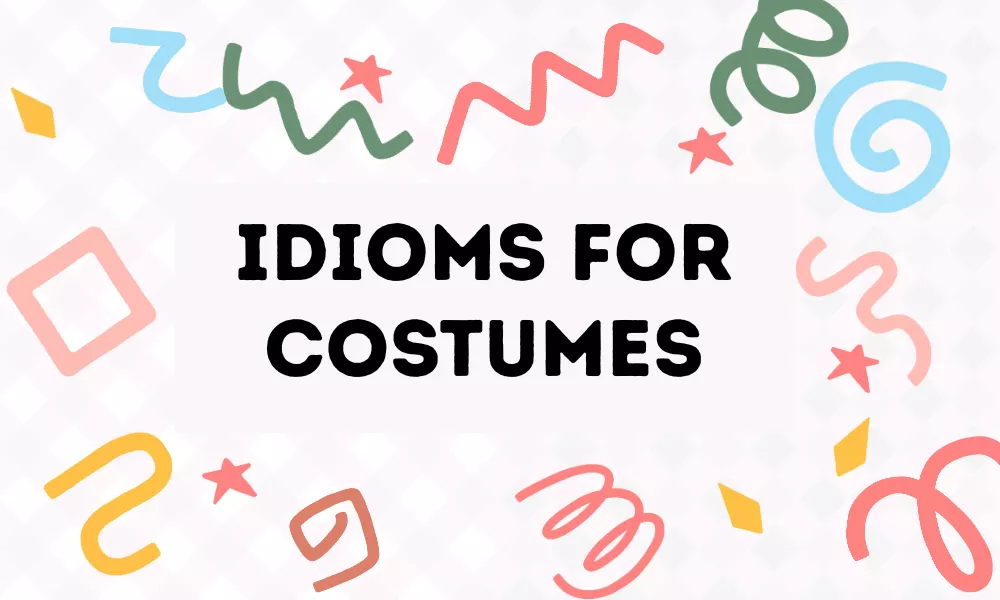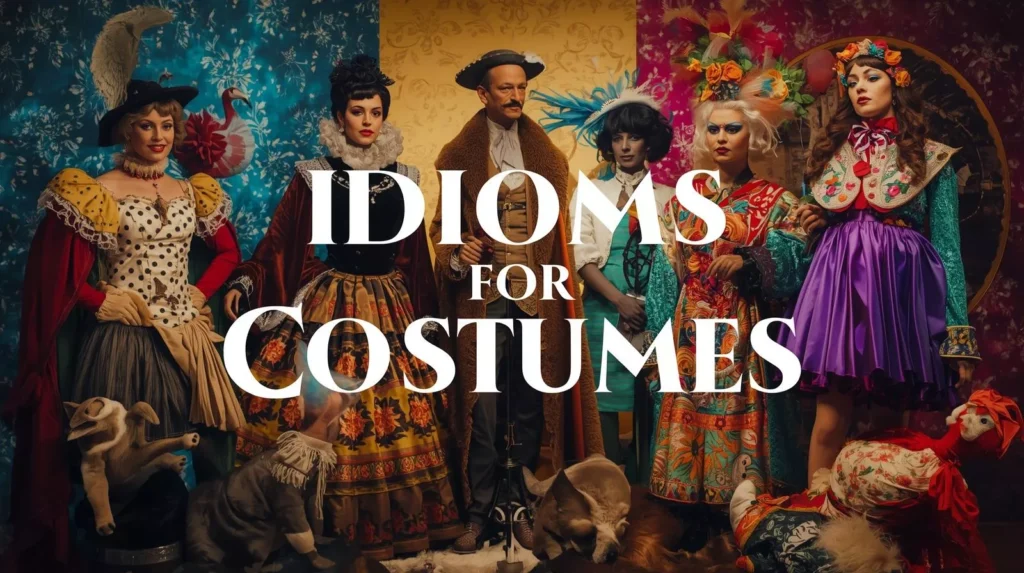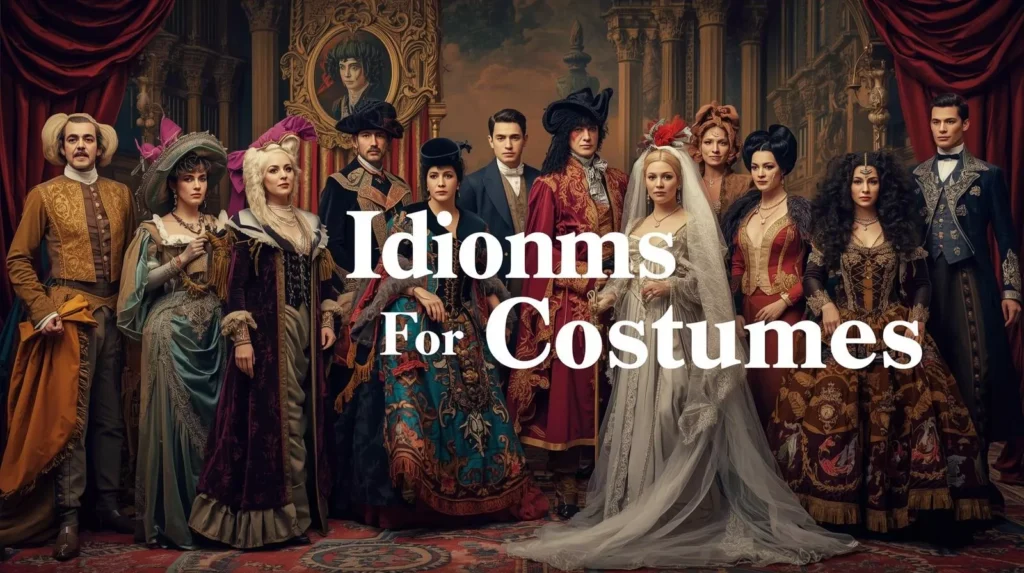Idioms for Costumes – Timeless Expressions of Dress and Disguise

Idioms are colorful expressions that make language more vivid and meaningful. Costumes have always been more than just outfits; they’re symbols of identity, disguise, and imagination. In everyday English, costume-related idioms use clothing as metaphors to describe emotions, behaviors, and life situations. They reflect how appearances can reveal or hide truths, just like a costume can transform a person’s role. Learning idioms for costumes not only enriches your vocabulary but also helps you speak and write with greater creativity and flair.
What Are Idioms for Costumes?
Costume Idioms are expressions that use clothing, disguises, or appearance-related ideas to describe human behavior, emotions, or situations in a figurative way. These idioms don’t literally refer to costumes but instead use them as symbols. For example, “to wear many hats” means to take on multiple roles, while “to hide behind a mask” means to conceal one’s true feelings or identity. Such expressions connect the concept of dressing up or changing appearance to how people act in real life.

Commonly Used Idioms for Costumes
- Dress to kill
Meaning: To wear very fashionable or attractive clothes to impress others.
Example: She walked into the party dressed to kill in a sparkling red gown. - Wear your heart on your sleeve
Meaning: To openly show your emotions.
Example: He’s the kind of person who wears his heart on his sleeve. - Fit like a glove
Meaning: To fit perfectly.
Example: The new costume fits her like a glove. - Wolf in sheep’s clothing
Meaning: Someone who appears kind but is actually dangerous.
Example: The charming salesman turned out to be a wolf in sheep’s clothing. - Put yourself in someone’s shoes
Meaning: To imagine how someone else feels.
Example: Try putting yourself in her shoes before judging her actions. - Tighten your belt
Meaning: To spend less money than usual.
Example: We’ll have to tighten our belts until we get paid. - At the drop of a hat
Meaning: Immediately; without hesitation.
Example: He’s ready to travel at the drop of a hat. - Lose your shirt
Meaning: To lose a lot of money.
Example: He lost his shirt investing in that failed business. - Wear the pants
Meaning: To be the person who makes decisions in a relationship.
Example: Everyone knows she wears the pants in the family. - Put a sock in it
Meaning: To tell someone to stop talking.
Example: I’m tired of your complaints, put a sock in it! - Buckle down
Meaning: To start working seriously.
Example: If you want good grades, you’d better buckle down. - Dressed to the nines
Meaning: Wearing very stylish or elegant clothes.
Example: They arrived at the wedding dressed to the nines. - Keep it under your hat
Meaning: To keep something secret.
Example: I’ll tell you, but keep it under your hat. - Have something up your sleeve
Meaning: To have a secret plan or idea.
Example: Don’t worry! I’ve got something up my sleeve. - Roll up your sleeves
Meaning: To prepare to work hard.
Example: It’s time to roll up our sleeves and get this done. - Put on your thinking cap
Meaning: To start thinking carefully.
Example: Let’s put on our thinking caps and solve this problem. - Cloak and dagger
Meaning: Secretive or mysterious actions.
Example: The meeting was full of cloak-and-dagger politics. - Take your hat off to someone
Meaning: To admire or respect someone.
Example: I take my hat off to her for all the work she’s done. - Wear many hats
Meaning: To have many roles or responsibilities.
Example: In this job, you have to wear many hats. - Under one’s hat
Meaning: To keep something private or confidential.
Example: Keep that information under your hat for now. - Throw one’s cap into the ring
Meaning: To enter a competition or take up a challenge.
Example: She threw her cap into the ring for the leadership position. - Pull something out of the hat
Meaning: To produce a surprising result.
Example: The coach pulled a win out of the hat. - Hang up your boots
Meaning: To retire or stop doing something.
Example: He decided to hang up his boots after 20 years on the field. - Have ants in your pants
Meaning: To be restless or impatient.
Example: The kids had ants in their pants waiting for the show to start. - Handle with kid gloves
Meaning: To treat someone gently or carefully.
Example: She’s very sensitive; handle her with kid gloves. - Keep your shirt on
Meaning: Stay calm and be patient.
Example: Keep your shirt on, the food will be ready soon. - All dressed up and nowhere to go
Meaning: Prepared for something that doesn’t happen.
Example: We were all dressed up and nowhere to go after the event got canceled. - Button your lip
Meaning: To stay silent or keep a secret.
Example: You’d better button your lip about the surprise. - Cut from the same cloth
Meaning: Very similar in behavior or character.
Example: The two brothers are cut from the same cloth. - Out of pocket
Meaning: To spend one’s own money.
Example: I had to pay out of pocket for the costume rental. - Best bib and tucker
Meaning: Wearing one’s best clothes.
Example: Everyone was in their best bib and tucker for the dinner. - Put on a brave face
Meaning: To pretend to be happy when you’re not.
Example: She put on a brave face after the bad news. - Keep your gloves on
Meaning: Stay calm and professional.
Example: Let’s keep our gloves on and not turn this into a fight. - Tight as a corset
Meaning: Extremely tight or restrictive.
Example: The schedule was as tight as a corset. - Wear a mask
Meaning: To hide one’s true self or feelings.
Example: He wears a mask of confidence, but he’s really insecure. - Hide behind a curtain
Meaning: To avoid being seen or taking responsibility.
Example: Stop hiding behind the curtain and speak your truth. - Throw on something
Meaning: To quickly put on clothes.
Example: She threw on a jacket and rushed out. - Like a glove puppet
Meaning: Controlled by someone else.
Example: He does whatever she says like a glove puppet. - Cut your coat according to your cloth
Meaning: Live within your means.
Example: We can’t afford luxury; let’s cut our coats according to our clothes. - Out at the seams
Meaning: Overcrowded or full.
Example: The hall was bursting at the seams. - Mutton dressed as lamb
Meaning: An older person dressed too youthfully.
Example: That outfit makes her look like mutton dressed as lamb. - Put a hat on something
Meaning: To finish or conclude something.
Example: Let’s put a hat on this project by Friday. - Belt and braces
Meaning: Taking extra precautions.
Example: He used a belt-and-braces approach to ensure success. - Hot under the collar
Meaning: Angry or embarrassed.
Example: He got hot under the collar when criticized. - With flying colors
Meaning: With great success.
Example: She passed her costume design exam with flying colors. - A feather in your cap
Meaning: An achievement to be proud of.
Example: Winning the award is another feather in his cap. - Buttoned up
Meaning: Reserved or secretive.
Example: He’s very buttoned up about his personal life. - Tight-lipped
Meaning: Unwilling to talk.
Example: She remained tight-lipped about her new project. - Put on airs
Meaning: To act superior or snobbish.
Example: He started putting on airs after getting the promotion. - Bare one’s soul
Meaning: To reveal one’s deepest thoughts or feelings.
Example: She bared her soul to her best friend.
Rare and Unique Idioms for Costumes
- Wear borrowed plumes
Meaning: To take credit for someone else’s work.
Example: He wore borrowed plumes by claiming her idea. - A cloak of respectability
Meaning: A false appearance of being moral or proper.
Example: The company hides corruption under a cloak of respectability. - Pull your socks up
Meaning: To improve your behavior or work.
Example: You’d better pull your socks up if you want to pass. - Put on sackcloth and ashes
Meaning: To show sincere remorse or repentance.
Example: He put on sackcloth and ashes after his mistake. - Hang by a thread
Meaning: In a very precarious or uncertain situation.
Example: His job is hanging by a thread after the scandal. - Wear out your welcome
Meaning: To stay too long and become annoying.
Example: He’s worn out his welcome at their house. - Cast off clothes
Meaning: To leave behind old habits or people.
Example: She cast off her old image and started fresh. - Unmask someone
Meaning: To reveal someone’s true identity or motives.
Example: The journalist unmasked the corrupt politician. - Pull the wool over someone’s eyes
Meaning: To deceive someone.
Example: Don’t let him pull the wool over your eyes. - Suit of armor
Meaning: A defensive attitude or emotional barrier.
Example: She wears a suit of armor to protect herself from criticism.
Read: Idioms For Culture
Costumes Idioms in Literature and Pop Culture
- Put on a brave face
Meaning: To hide sadness or fear.
Example: In Harry Potter, characters often put on a brave face during danger. - Wolf in sheep’s clothing
Meaning: Evil disguised as good.
Example: Used in many fables, including Aesop’s stories. - The emperor’s new clothes
Meaning: Pretending something false is true.
Example: From Hans Christian Andersen’s tale criticizing vanity. - Behind the mask
Meaning: Hidden identity or emotions.
Example: In The Phantom of the Opera, the mask symbolizes secrecy and pain. - Dressed to kill
Meaning: To impress or attract.
Example: Frequently used in fashion shows and songs. - A wolf in designer clothing
Meaning: A modern twist on deception.
Example: Pop culture uses it for charming but dangerous characters. - Wear your crown proudly
Meaning: Embrace your identity or success.
Example: Common in songs and empowerment messages. - Don the cape
Meaning: To take on a heroic role.
Example: Superheroes like Batman and Superman literally and symbolically “don the cape.” - Take off the mask
Meaning: Reveal your true self.
Example: A theme in movies about authenticity and vulnerability. - Under the cloak of darkness
Meaning: Doing something secretly or illegally.
Example: Used in literature to describe stealthy actions, like in mystery novels.

Synonyms and Alternatives for Costumes
| Synonym | Meaning |
|---|---|
| Attire | A general term for clothing, especially formal or special outfits. |
| Outfit | A set of clothes worn together for a specific occasion or purpose. |
| Ensemble | A coordinated combination of clothing pieces that create a stylish look. |
| Apparel | A more formal word for clothing, often used for special or themed garments. |
| Garment | A single piece of clothing such as a dress, coat, or suit. |
| Disguise | Clothing worn to conceal one’s identity or alter appearance. |
| Uniform | Standard clothing worn by members of a group, profession, or organization. |
| Wardrobe | A collection of clothes a person owns or uses. |
| Masquerade | Clothing and masks worn for entertainment, often at themed or fancy events. |
| Regalia | Decorative or ceremonial clothing, especially for formal occasions or roles. |
Tips for Using Costumes Idioms in Writing and Speech
- Match the Context:
Use costume idioms that fit the tone; for instance, “wearing many hats” works well in professional writing, while “dressed to kill” suits a casual or creative tone. - Add Character Depth:
In storytelling, use idioms like “behind the mask” or “put on a brave face” to reveal hidden emotions or motivations in characters. - Enhance Visual Imagery:
Costume idioms create vivid pictures in the reader’s mind. Use them to make descriptions more expressive and memorable. - Use for Symbolism:
Idioms such as “wolf in sheep’s clothing” or “cloak and dagger” can symbolize deceit, mystery, or transformation which are perfect for essays, speeches, or fiction. - Avoid Overuse:
Sprinkle idioms naturally within your writing or speech. Too many can sound forced; balance them with direct expressions for clarity and impact.
Read: Idioms For Joy
Read: Idioms For Death
FAQs
Conclusion
Costume idioms add style, imagination, and depth to our everyday language. They help us describe emotions, appearances, and situations in colorful, creative ways, just like costumes transform how someone looks or feels. Whether you’re “putting on a brave face” or “wearing many hats,” these expressions make your communication more vivid and relatable. Learning idioms for costumes is not only fun but also a powerful way to sound more natural and expressive in English.
